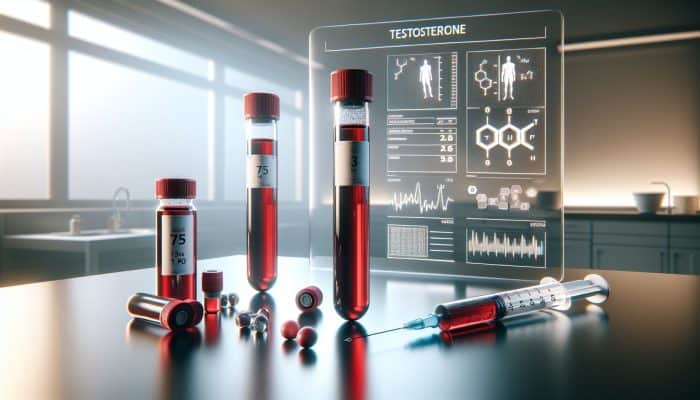Uncover the Importance of a Testosterone Blood Test for Your Health
Key Metrics Assessed During a Testosterone Blood Test

The Testosterone Blood Test in Newport serves as an indispensable diagnostic tool that measures the concentration of testosterone circulating in your bloodstream. This vital hormone is primarily produced in the testicles in men and is crucial for maintaining various aspects of male health, including libido, muscle mass, and overall vitality. In women, testosterone is produced in lesser quantities by the ovaries and adrenal glands, playing a significant role in their health and overall energy levels. The results from a testosterone test can greatly assist healthcare professionals in evaluating an individual's hormonal balance, thereby identifying potential health concerns related to hormonal disorders.
As awareness regarding hormonal health grows, monitoring testosterone levels is becoming increasingly important for diagnosing conditions such as hypogonadism, a condition characterised by insufficient testosterone production. By detecting these imbalances at an early stage, healthcare professionals can provide customised treatment plans that significantly improve health outcomes and enhance the overall quality of life for their patients.
Understanding the Procedure for Testosterone Testing
The procedure for testing testosterone levels is typically uncomplicated and efficient, usually involving the collection of a small blood sample from your arm. This task is performed by qualified healthcare professionals who ensure the experience is quick and minimally uncomfortable. The standard method employs a fine needle to draw blood, which is then collected in a vial for detailed laboratory analysis.
Prior to undergoing the test, it is advisable to relax, as this can help prevent any anxiety-related fluctuations in your hormone levels. The entire procedure usually takes only a few minutes, making it a convenient option for assessing your hormonal health. Following the blood draw, you can generally return to your normal activities immediately, ensuring a hassle-free experience without disruption to your day.
Reasons to Consider a Testosterone Test for Your Health
There are many compelling reasons to consider undergoing a testosterone test, especially if you are experiencing symptoms that may indicate low testosterone levels. Commonly reported issues include chronic fatigue, diminished sex drive, mood swings, and challenges related to muscle strength or mass. These symptoms can significantly impact your quality of life, underscoring the importance of identifying the underlying issues contributing to these changes.
Moreover, conditions such as erectile dysfunction, infertility, and various mood disorders can all correlate with abnormal testosterone levels. By conducting a testosterone blood test, healthcare professionals can accurately diagnose potential hormonal imbalances and develop tailored treatment strategies, thus improving the overall health and well-being of their patients.
Factors Influencing Testosterone Levels: What You Need to Know

Understanding the various factors that can affect testosterone levels is essential for accurately interpreting the results of your test. One significant factor is age, as testosterone levels naturally decline with increasing years. Lifestyle choices, including diet and exercise, play a critical role in regulating hormone levels. For instance, obesity is frequently associated with lower testosterone levels, whereas maintaining an active lifestyle through regular physical activity can promote hormone production.
In addition, specific medical conditions, such as diabetes, metabolic syndrome, and various hormonal disorders, can have a direct impact on testosterone levels. It is also important to recognise that certain medications, especially those used in hormonal therapies, may affect the results of the test. Being aware of these influencing factors is crucial for accurately interpreting the outcomes of testosterone tests and devising an effective treatment plan.
- Age
- Lifestyle factors (diet, exercise)
- Medical conditions (diabetes, metabolic disorders)
- Medications (hormonal therapies)
- Stress levels
- Sleep quality
- Alcohol consumption
- Smoking
Expert Guidance for Conducting Testosterone Blood Tests in Newport
How to Prepare Effectively for Your Testosterone Test
Preparing for a testosterone blood test in Newport is a straightforward process that can significantly enhance the accuracy of your results. It is generally recommended by healthcare professionals to fast for several hours prior to the test, specifically advising against consuming anything other than water for at least 8 hours before your appointment. This precaution is intended to eliminate any potential interference that food intake might have on your hormone levels.
Moreover, it is crucial to inform your healthcare provider about any medications or supplements you are currently taking, as these could influence your test results. Managing stress is also vital; aim to remain calm before the test, as anxiety can temporarily affect hormone levels. Here are some essential preparation steps to follow:
- Avoid eating or drinking (except water) for 8 hours before the test
- Inform your doctor about any medications or supplements
- Stay hydrated with water
- Attempt to relax and manage stress before the test
- Schedule the test for the morning for optimal accuracy
What to Expect After Completing Your Testosterone Test

Once you have completed your testosterone blood test, you can generally expect to receive your results from your healthcare provider within a few days to a week. The process of obtaining your results is typically straightforward; your healthcare provider will contact you to discuss the findings in detail. They will interpret your testosterone levels in the context of your overall health and determine if any follow-up tests or treatments are necessary.
This efficient process ensures that you won't have to wait long to gain insights into your hormonal health. If your testosterone levels fall within the normal range, the provider may recommend ongoing monitoring of your health. However, if any issues arise, they will present a tailored action plan to address the concern, ensuring you receive the necessary support to enhance your well-being.
Benefits of Regular Testosterone Testing for Your Health
Engaging in regular testosterone testing presents numerous advantages, especially for individuals at risk of hormonal imbalances. Consistent monitoring of your hormone levels can facilitate the early detection of conditions such as hypogonadism, allowing for timely interventions that can significantly improve long-term health outcomes.
In addition to the early identification of potential issues, regular testing enables healthcare providers to track fluctuations in testosterone levels over time. This information is invaluable for assessing the efficacy of treatments or lifestyle changes. Furthermore, it can provide patients with peace of mind, knowing their hormone levels are being closely monitored and managed. Ultimately, early intervention can lead to a markedly improved quality of life while preventing complications associated with untreated hormonal imbalances.
Where to Get a Testosterone Blood Test in Newport
Clinics Offering Testosterone Testing Services
In Newport, a variety of clinics offer testosterone blood tests, ensuring that residents have access to vital evaluations of their hormonal health. Local GP surgeries often provide these tests as part of comprehensive health assessments, typically covered by the NHS for eligible patients. Additionally, private health clinics in Newport provide testosterone testing services, catering to those seeking immediate results or personalised care.
Choosing a reputable provider is essential for obtaining accurate results. Look for clinics staffed by qualified healthcare professionals with a solid track record in conducting hormone tests. Local recommendations and online reviews can help in identifying a trusted clinic, ensuring that you receive reliable and efficient service.
How to Schedule Your Appointment for Testing
Scheduling an appointment for a testosterone blood test in Newport is a simple and straightforward process. Most clinics offer various methods for booking, including phone consultations and online reservations through their websites. This flexibility allows you to select the option that best accommodates your schedule.
When making your appointment, it is wise to inquire about availability, as demand for health services can fluctuate. Booking in advance is often advisable to secure your preferred time slot. Furthermore, when contacting the clinic, be prepared to share basic information about your medical history and the symptoms that prompted the test. This information assists healthcare professionals in understanding your needs and scheduling the appropriate tests.
Understanding the Costs Associated with the Test
The costs linked to a testosterone blood test in Newport can vary widely, depending on whether you choose NHS services or opt for a private clinic. If you qualify for NHS services, you may receive a testosterone test at no charge; however, be aware that waiting times can differ, so consider this aspect when determining your approach.
For those opting for private healthcare, the costs for testosterone blood tests typically range from £40 to £200, influenced by the clinic and any additional services included in the package. It is beneficial to verify with the clinic ahead of time regarding the costs involved and whether they offer any package deals that encompass follow-up consultations or supplementary tests.
Duration of the Testing Process: What to Expect
The testosterone blood test procedure itself is quick, usually taking just a few minutes to complete. After your blood sample is collected, it is sent to a laboratory for analysis, which may require a few days to a week for results to be processed. This efficiency ensures you receive timely information regarding your hormone levels.
While the actual test is brief, it is wise to factor in any potential waiting time at the clinic. Arriving slightly early for your appointment can help streamline the process. If your results indicate a concern that requires further investigation, your healthcare provider will guide you on the necessary next steps to ensure proper care.
What to Anticipate During the Testosterone Testing Process
During a testosterone blood test, you will undergo a routine procedure designed for maximum comfort. A qualified healthcare professional will prepare the area on your arm before inserting a small needle to draw blood. Most patients report minimal discomfort, describing it as a slight pinch that quickly fades.
Once the blood sample is taken, a small bandage will be applied to prevent any bleeding. The entire process is efficient, allowing you to return to your daily activities with minimal disruption. If you have concerns about needle procedures or blood tests, discuss these with your healthcare provider beforehand to receive reassurance and guidance tailored to your needs.
Assessing the Accuracy of Testosterone Blood Tests
Factors Influencing Accuracy: What You Should Know
Numerous factors can impact the accuracy of a testosterone blood test, making it crucial to consider these elements when preparing for and interpreting the results. The timing of the test plays a significant role; testosterone production naturally fluctuates throughout the day. Therefore, it is generally advisable to schedule the test for the morning when testosterone levels are typically at their peak.
Additionally, recent physical activity can influence hormone levels; engaging in vigorous exercise shortly before the test may temporarily elevate testosterone levels. Certain medications, particularly those affecting hormonal balance, can also result in inaccurate outcomes. Furthermore, stress levels and sleep quality before the test may affect results, as both can impact hormone production. To ensure the most reliable results, it is essential to closely follow pre-test instructions provided by your healthcare provider.
- Time of day (morning testing is recommended)
- Recent physical activity or exercise
- Medications affecting hormonal balance
- Stress levels
- Sleep quality before the test
- Food and drink intake
Reliability of Test Results: What You Need to Know
Testosterone blood tests are generally regarded as reliable when performed under proper protocols. Laboratories implement stringent measures to ensure accuracy in hormone level assessment; however, individual factors can still affect results. Engaging in a discussion with your healthcare provider about any pre-test considerations is vital for achieving optimal accuracy.
It is essential to remember that no test is infallible. If your results indicate levels outside the normal range, it is crucial to follow up with your healthcare provider. They can interpret these results in the context of your overall health and determine if further testing or intervention is warranted, thus ensuring you receive appropriate care based on your unique situation.
Steps to Take If You Require a Retest
If your initial testosterone test results are inconclusive or if you continue to experience symptoms, your healthcare provider may recommend a retest. This is a common practice that allows for a more accurate assessment of hormone levels over time. Variations in lifestyle, stress, or health status can contribute to fluctuating results.
A retest can provide additional insights and help confirm or rule out any issues related to your testosterone levels. Your healthcare provider will guide you through the retesting process, ensuring that subsequent steps are tailored to your individual health needs. This ongoing monitoring is essential for effectively managing any hormonal imbalances and ensuring optimal health.
Evidence-Based Advantages of Testosterone Blood Testing in Newport
How Regular Testing Can Enhance Your Overall Health
Engaging in regular testosterone testing has the potential to significantly improve your health by identifying and managing conditions such as hypogonadism at an early stage. By monitoring your hormone levels, healthcare professionals can create personalised treatment plans tailored to your specific requirements, leading to better health outcomes. For instance, maintaining optimal testosterone levels can support increased energy, mood stability, and overall vitality.
Moreover, the early detection of hormonal imbalances allows for proactive management, which is vital for preventing complications associated with untreated low testosterone levels. This preventive approach can ultimately lead to a better quality of life, as individuals regain control over their health and well-being through informed choices and effective treatments tailored to their needs.
Long-Term Benefits of Continuous Monitoring of Hormone Levels
The long-term advantages of regular testosterone testing include sustaining optimal hormone levels over time and significantly reducing the risk of related health issues. Conditions associated with low testosterone can include osteoporosis, cardiovascular disease, and metabolic syndrome, all of which can profoundly affect overall health and quality of life.
By consistently monitoring testosterone levels, healthcare providers can evaluate trends and implement timely adjustments to treatment plans. This ongoing observation can also support lifestyle recommendations, such as exercise and dietary changes, further optimising hormonal balance. Ultimately, long-term monitoring serves as a vital tool for maintaining health and preventing future complications associated with hormonal imbalances.
Importance of Testing for Specific Health Conditions
Indeed, testosterone testing can play a crucial role in diagnosing and managing particular health conditions such as erectile dysfunction, infertility, and certain types of anemia. For example, erectile dysfunction frequently signifies low testosterone levels, and precise testing can help determine the most effective course of action for treatment.
In cases of infertility, testosterone assessments can uncover underlying hormonal issues that may be obstructing sperm production. Additionally, certain types of anemia may correlate with hormonal imbalances, making testosterone testing an essential component of a thorough health evaluation. By addressing these specific conditions through targeted testing and treatment, healthcare providers can significantly enhance health outcomes and improve the quality of life for patients facing these challenges.
Effective Approaches for Testosterone Blood Testing in Newport
How to Accurately Interpret Your Testosterone Test Results
Interpreting your testosterone test results involves comparing them against established normal ranges. These ranges can vary slightly based on the laboratory and testing methods used; therefore, consulting your healthcare provider for precise interpretation is essential. Understanding where your levels fall within these ranges can provide valuable insights into your health status.
Your healthcare provider will explain what your testosterone levels indicate concerning your symptoms and overall health context. If your levels are found to be low, they will discuss potential treatment options, lifestyle changes, or further testing that may be necessary to address the issue effectively. The key lies in maintaining open communication and actively participating in your health journey to achieve the best outcomes.
- Consult your healthcare provider for interpretation.
- Understand normal ranges as a basis for comparison.
- Discuss symptoms in relation to your results.
- Explore potential treatment options if levels are low.
- Consider lifestyle changes alongside medical advice.
Follow-Up Actions to Consider Based on Your Test Results
Depending on your testosterone test results, your healthcare provider may suggest a variety of follow-up actions. If your levels are deemed low, they might recommend lifestyle modifications, such as improving your diet and increasing physical activity, which can help naturally elevate testosterone levels.
If lifestyle changes alone prove insufficient, medications or hormone replacement therapy may be considered as potential solutions. Regular follow-up testing might also be advisable to monitor your progress and adjust your treatment plan as necessary. It is vital to adhere to your healthcare provider’s recommendations to effectively manage your hormonal health and ensure optimal well-being.
Accessing Support and Resources in Newport for Hormonal Health
In Newport, there are many support groups and resources available for individuals facing testosterone-related issues. These groups can offer valuable information, community support, and a platform for sharing experiences with others undergoing similar challenges. Engaging with these resources can significantly aid your understanding of your condition and help you connect with others who share your experiences.
Additionally, many healthcare providers and clinics in Newport offer educational materials concerning testosterone health, empowering patients to make informed decisions regarding their health management. Engaging with these resources encourages individuals to take charge of their health and collaborate effectively with healthcare providers to achieve optimal outcomes.
Frequently Asked Questions About Testosterone Testing
What does a testosterone blood test measure?
A testosterone blood test evaluates the level of testosterone in your blood, assisting in diagnosing hormonal imbalances that may affect your health.
How accurate are testosterone blood tests?
When performed correctly, testosterone blood tests are generally reliable; however, several factors can influence their accuracy, making pre-test preparation crucial.
What symptoms may indicate low testosterone levels?
Symptoms of low testosterone often include fatigue, reduced libido, mood changes, and decreased muscle mass, which can significantly impact one's quality of life.
What is required for preparation before a testosterone blood test?
Preparation involves fasting for at least 8 hours before the test, informing your doctor about any medications you are taking, and attempting to remain relaxed to ensure accurate results.
How long does it take to receive testosterone test results?
Test results typically arrive within a few days to a week, contingent upon the laboratory's processing time and workload.
What actions should I take if my testosterone levels are low?
Consult your healthcare provider for interpretation of results and potential treatment options, as well as lifestyle modifications to help improve your hormonal health.
Are there specific conditions that testosterone testing can help diagnose?
Yes, testosterone testing can aid in diagnosing conditions such as erectile dysfunction, infertility, and certain types of anemia, facilitating appropriate treatment.
Where can I obtain a testosterone blood test in Newport?
Numerous clinics and GP surgeries in Newport offer testosterone blood tests, providing both NHS and private options for residents seeking evaluation.
What are the costs linked to a testosterone blood test in Newport?
Costs vary, with NHS tests often provided free for eligible patients, while private tests generally range from £40 to £200, depending on the clinic and services included.
How frequently should I have my testosterone levels tested?
The frequency of testing depends on individual health needs; it is best to consult your healthcare provider for personalised recommendations based on your health status.
Connect with us on Facebook!
This Article Was First Found On https://bloodtest.co.uk
The Article Testosterone Blood Test: Your Local Newport Guide Was Found On https://limitsofstrategy.com

